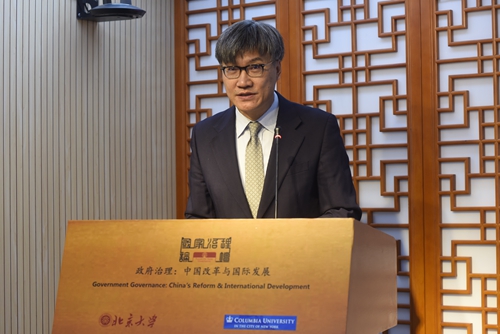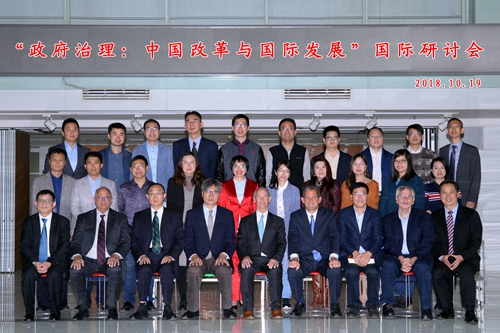Peking University, Oct. 25, 2018: In order to promote the cooperation and academic exchanges on government governance between China and America, the Seminar on Government Governance: China’s Reform and International Development was held on October 19th 2018 at Peking University (PKU). Co-hosted by PKU Institute of Governance Studies and Columbia University School of International and Public Affairs, the seminar is also the third US-China Government Governance Forum. More than 30 scholars from Columbia University, the Brookings Institute, Chinese Academy of Governance, Peking University, Tsinghua University, Sichuan University and other institutes attended the seminar. Professor Tian Kai, deputy dean of Institute of Governance Studies, hosted the opening ceremony.
Wang Bo delivering a speech
PKU Executive Vice President Wang Bo delivered a welcome speech. He noted that since China’s reform and opening-up more than 40 years ago, China has been making progress with other countries for coordinated development. Meanwhile, the relationship between China and the world has undergone profound changes. Among them, the China-U.S. relationship is surely the most important, complex and cooperative relationship in the globe today.
Professor Wang Puqu, dean of Institute of Governance Studies, and Professor Merit Janow, dean of Columbia University School of International and Public Affairs, gave their lectures respectively. They both emphasized the significance of strengthening academic exchanges which helps to investigate fresh methods to improve governance and to deal with arising problems.
In the following, six scholars presented two keynote speeches.
During the first session of keynote speech on "Models of government governance strategy and an International comparison", Professor Cheng Li, director of the John Thornton China center of the Brookings institution, analyzed issues concerning Trump administration. He also argued that the gradual shrinking of the American middle class was deeply affecting American political development and governance. Next, Professor Robert Zachary Tumin, from School of International and Public Affairs of the University of Colombia, traced the achievements of the Compare Statics system since the 1990s and examined the applicability of the system. At last, Professor Yang Lihua, from Peking University School of Government, shared his recent research findings about China's policy experiments.
The second keynote speech session was titled "Government Governance and Industrial Policy Innovation". Professor William B. Eimicke, executive director of the the Picker Center for Executive Education at Columbia University, introduced the latest findings of his research on social value investment. He pointed out that the role of social and individual factors in shaping society should be paid attention to, and the government's cooperation with the private sectors and the public can save costs and improve efficiency to a large extent. According to Professor Song Lei, in the study of industrial policy, the political dimension of industrial policy mainly centers around the shaping mechanism of national will and political process on the causal process of industrial policy. In addition, Professor Robert William Walsh provided a specific example of New York’s policy in the 1980s to illustrate the importance of coordination among small enterprises, community and government.
In the afternoon, the seminar is divided into three parallel sessions, namely, the Theoretical Development and Innovation of Government Governance, Government Governance and Public Service Supply Innovation, and Smart Government and Data Governance.
Eventually, William B. Eimicke and Wang Puqu delivered the closing address. They stated that the two most important countries in the world are China and the United States, and the scholars of the two countries are the "bridge of communication". The two sides agreed to hold next year’s Government Governance Forum at Columbia University to explore issues of common concern.
Written by: Wang Xi
Edited by: Huang Yadan

